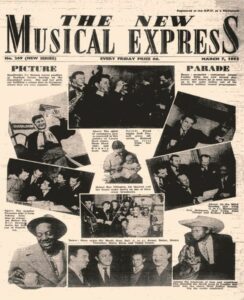What are the opportunities for a digital-only NME?

Another week, another print closure. Or, to put it in the euphemistic terms of the press releases: Another week, another refocusing on digital strengths.
The New Musical Express (NME) is shuttering its print operation after a much-publicised move to a free distribution model in summer 2015 which was designed to boost the magazine’s attractiveness to advertisers through an increase in circulation. In the announcement, Time Inc’s UK group managing director Paul Cheal explained that industry-wide falling print ad spend despite the increase had been the final straw for the print operation:
“Unfortunately we have now reached a point where the free weekly magazine is no longer financially viable. It is in the digital space where effort and investment will focus to secure a strong future for this famous brand.”
Whether the NME’s digital presence is strong enough to survive without significant cost savings is unclear. For starters, it faces much the same issue as celebrity-focused magazines – platforms have usurped publications as the primary means for fans to keep up to speed with their favourite bands and artists. It has also arguably lost its niche appeal as a specialist ‘new music’ focused-title in the transition to a free publishing model, and while the NME could in theory pivot back to being a discovery platform for new music, services like Spotify arguably do a better job of that on a much more personalised scale.
Even comparisons to another prominent brands that have gone digital-only lately only serve to illustrate that NME’s USP online isn’t very clear. Glamour, by nature of its upmarket fashion focus, has opportunities around ecommerce that the NME does not.
Reactions to the news have largely been fans – those who work in the industry and those who don’t alike – expressing their disappointment that a venerable brand is shuttering the format they grew up with. My Media Voices co-host Peter Houston mentioned this week that nostalgia is one hell of a drug, but he also noted that for him the writing was on the wall when NME featured Rihanna on its front cover. In his opinion, the magazine lost its niche appeal and, consequently, the reason for an audience to pick it up.
Not everybody shares that opinion, however. Writing for the Guardian, Alexis Petridis argued the title should have gone broader:
“Perhaps if it had paid less attention to market research and kept its musical outlook broad, it might have survived longer, better-equipped to navigate an era in which R&B and hip-hop are commercially and creatively dominant, and grime is the underground genre enjoying the biggest crossover into mainstream success.”
The problem with Petridis’ read of the situation is that generalist publications are the ones who are struggling the most as a result of the ascendancy of the internet. Easy replicability has been the death knell for many publications, in part because they’re hard to build subscriptions around, but also because they’re easy to get lost in the crowd.
A counterpoint to Petridis’ point can be found in the continued existence of Team Rock’s music-focused titles, which are much more specific in nature than late-era NME, and have outlasted more mainstream music-focused titles.
The same is true for many digital publications and purely digital outlets. Given that the internet allows for the congregation of disparate fans around very specific subject areas, the opportunity for publishers isn’t to go broad online, but to go very deep in a niche market. As NME transitions to a digital-only existence, Time Inc UK should bear in mind that smaller, more dedicated communities tend to be easier to monetise.
Chris Sutcliffe
enquiries@trippassociates.co.uk
Martin Tripp Associates is a London-based executive search consultancy. While we are best-known for our work in the TMT (technology, media, and telecoms) space, we have also worked with some of the world’s biggest brands on challenging senior positions. Feel free to contact us to discuss any of the issues raised in this blog.